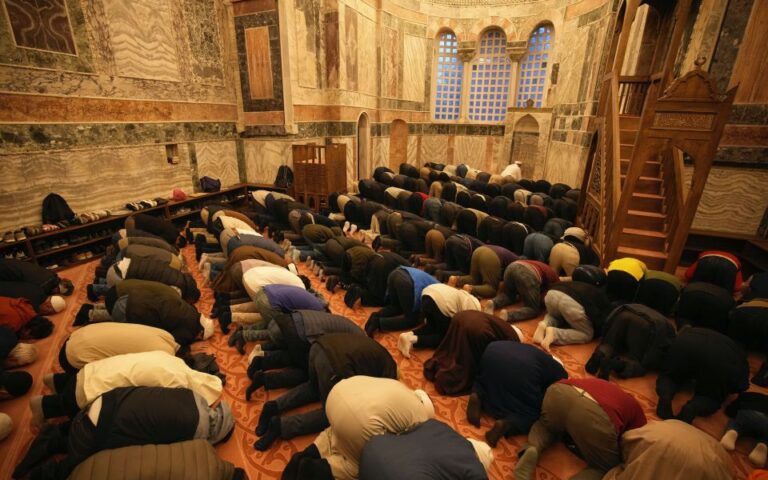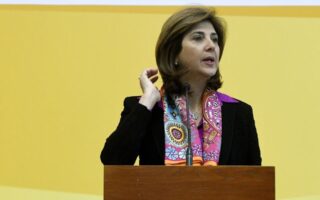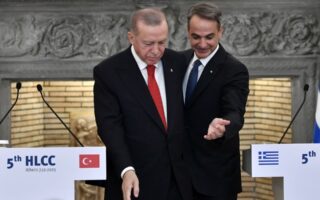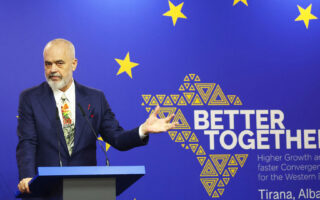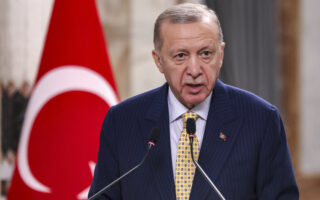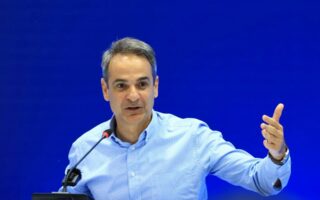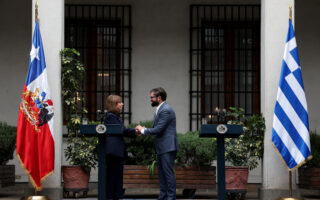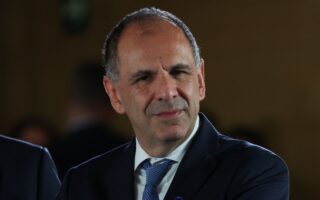The formal opening of a former Byzantine church in Istanbul as a mosque “insults its character as a UNESCO world cultural heritage monument belonging to humanity,” the Foreign Ministry has said.
DIPLOMACY
The expected victory of the center-right nationalist VMRO-DPMNE party in North Macedonia’s presidential and parliamentary elections is worrying Greek officials, who do not know how far the new government will go towards questioning, or even repudiating, the 2018 Prespes Agreement, which put an end to nearly 30 years of tension between the two countries over the name “Macedonia,” which Greeks considered an outright (mis-) appropriation, not only of the geographical entity but of the heritage of the ancient Greek Kingdom of Macedonia.
On his first visit to Europe in five years, Chinese President Xi Jinping appears intent on seizing opportunities to loosen the continent’s bonds with the United States and forge a world freed of American dominance.
The UN secretary-general’s special envoy for Cyprus, Angela Holguin Cuellar, is expected to visit the island on Tuesday for a new round of contacts.
After the Easter respite, party leaders resume their pre-election campaigns on Tuesday, as we enter the last stretch before the European Parliament elections.
The conviction by the Albanian authorities of Himare mayor-elect Fredi Beleri is “flimsy and baseless,” the chairman of the EU-Albania Joint Parliamentary Stabilization and Association Committee and New Democracy MEP Manolis Kefalogiannis reiterated on Monday after visiting the jailed ethnic-Greek politician.
Greek and Turkish officials are trying to finalize the details of the visit by Prime Minister Kyriakos Mitsotakis to Ankara on May 13, when he will meet with the president of Turkey, Recep Tayyip Erdogan.
Questions have arisen as to whether Albanian Prime Minister Edi Rama’s visit to Athens will finally be allowed on May 12, when he is scheduled to address a gathering of Albanian immigrants, members and friends of his party.
The reasons why Turkish President Recep Tayyip Erdogan’s planned visit to Washington was called off lie in the distant, but also the recent past.
This part of the world has always been full of surprises.
The existing parameters of the United Nations are flexible enough to facilitate a settlement to the Cyprus dispute that addresses the priorities of both sides on the ethnically split Mediterranean island, Nusrat Ghani, the UK’s minister of state for Europe, says.
Meeting with Erdogan not affected by his postponement of US visit, but Athens aware of risks
Greek President Katerina Sakellaropoulou wrapped up her official visit to Chile unveiling a replica of the Kore statue from the Archaic period that will go on display at Santiago’s Grecia metro station. Donated by the Acropolis Museum the artefact is meant to symbolize the friendly ties between the two nations.
Amberin Zaman, Al-Monitor’s chief correspondent covering major stories on the Middle East and North Africa, including Turkey, joins Thanos Davelis to get to the bottom of the rumors around whether Erdogan’s White House visit was canceled or not.
Greek President Katerina Sakellaropoulou and Chile’s counterpart Gabriel Boric shake hands at La Moneda government palace in Santiago, Chile, on April 24, 2024.
In the first visit of a Greek foreign minister to Doha in five years, George Gerapetritis praised the mediation role of Qatar, stating that Greece has already offered its services and is a reliable interlocutor of all sides and supports in any way it can the resolution of the Middle East crisis.
